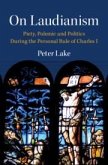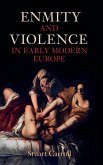Peter Lake (Tennessee Vanderbilt University)
On Laudianism
Peter Lake (Tennessee Vanderbilt University)
On Laudianism
- Broschiertes Buch
- Merkliste
- Auf die Merkliste
- Bewerten Bewerten
- Teilen
- Produkt teilen
- Produkterinnerung
- Produkterinnerung
Laudianism was both a way of being Christian and a political ideology. This definitive account of this intensely controversial movement explores how it helped cause the English civil war, but over the long term provided one of the visions of the national church, one that has been in contention to define 'Anglicanism' ever since.
Andere Kunden interessierten sich auch für
![On Laudianism On Laudianism]() Peter Lake (Tennessee Vanderbilt University)On Laudianism48,99 €
Peter Lake (Tennessee Vanderbilt University)On Laudianism48,99 €![Enmity and Violence in Early Modern Europe Enmity and Violence in Early Modern Europe]() Stuart Carroll (University of York)Enmity and Violence in Early Modern Europe31,99 €
Stuart Carroll (University of York)Enmity and Violence in Early Modern Europe31,99 €![Enmity and Violence in Early Modern Europe Enmity and Violence in Early Modern Europe]() Stuart Carroll (University of York)Enmity and Violence in Early Modern Europe40,99 €
Stuart Carroll (University of York)Enmity and Violence in Early Modern Europe40,99 €![Devil-Land Devil-Land]() Clare JacksonDevil-Land17,99 €
Clare JacksonDevil-Land17,99 €![Revolution Revolution]() Peter AckroydRevolution28,99 €
Peter AckroydRevolution28,99 €![Hunting the Falcon Hunting the Falcon]() John GuyHunting the Falcon10,99 €
John GuyHunting the Falcon10,99 €![The Oxford Illustrated History of Britain The Oxford Illustrated History of Britain]() Kenneth O. MorganThe Oxford Illustrated History of Britain24,99 €
Kenneth O. MorganThe Oxford Illustrated History of Britain24,99 €-
-
-
Laudianism was both a way of being Christian and a political ideology. This definitive account of this intensely controversial movement explores how it helped cause the English civil war, but over the long term provided one of the visions of the national church, one that has been in contention to define 'Anglicanism' ever since.
Produktdetails
- Produktdetails
- Cambridge Studies in Early Modern British History
- Verlag: Cambridge University Press
- Seitenzahl: 632
- Erscheinungstermin: 10. April 2025
- Englisch
- Abmessung: 229mm x 152mm x 34mm
- Gewicht: 894g
- ISBN-13: 9781009306799
- ISBN-10: 1009306790
- Artikelnr.: 72878101
- Herstellerkennzeichnung
- Libri GmbH
- Europaallee 1
- 36244 Bad Hersfeld
- gpsr@libri.de
- Cambridge Studies in Early Modern British History
- Verlag: Cambridge University Press
- Seitenzahl: 632
- Erscheinungstermin: 10. April 2025
- Englisch
- Abmessung: 229mm x 152mm x 34mm
- Gewicht: 894g
- ISBN-13: 9781009306799
- ISBN-10: 1009306790
- Artikelnr.: 72878101
- Herstellerkennzeichnung
- Libri GmbH
- Europaallee 1
- 36244 Bad Hersfeld
- gpsr@libri.de
Peter Lake is University Distinguished Professor of History and Professor of the History of Christianity, Divinity School at Vanderbilt University, USA. From 1993-2009 he was Professor of History at Princeton University, USA. He is the author of many books including The Boxmaker's Revenge and a forthcoming volume on Shakespeare's history plays.
Introduction: Part I. Laudianism, where it Came From: 1. A Trinitarian and incarnational theology
2. Andrewes' political theology
3. Andrewes' anti-puritanism
4. Puritan politics
5. The tree of repentance and its fruits
6. Absent presences
the role of predestination in Andrewes' divinity
7. The visible church and its ordinances
Part II. Laudianism, what it was: 8. The house of God
9. The house of God and the beauty of holiness
10. The beauty of holiness and ceremonial conformity
11. Church ceremonies, the authority of the church and the authority of scripture
12. Prayer
13. Preaching
14. The sacrament and the altar
15. The sacrament and the social body of the church
16. The altar and visible succession
17. The feasts and festivals of the church, or putting the sabbath in its place
18.Sunday sports and the re/constitution of the Christian community and the social order
19. The sabbath and the Laudian attitude to authority
Part III. Laudianism, what it was n't: 20. Order, puritanism and the state of the English church
21. Puritan 'privacy', or the forms of puritan voluntary religion anatomized
22. A religion of the word and the question of authority
23. Puritanism, popularity and politics
24. Of moderate puritans and popular prelates
25. The puritan threat, the church of England and the Personal Rule as a period of reformation
Part IV. Laudianism and Predestination: 26. Laudianism, puritanism and Arminianism revisited
27. The language of mystery
28. Fatal necessity
29. Predestination, the positive case: of justice and mercy, prescience and predestination
30. Faith, hope and charity
31. Effort without merit
repentance, amendment and the works of penitence
Part V. Laudianism as Coalition, the Constituent Parts: 32. Dis-aggregating, or the pleasures and benefits of splitting
33. Of converts, collaborators and apostates, i, puritans
34. Of converts, collaborators and apostates, ii, Calvinist conformists
35. Of apparatchiks, zealots and coming men
36. The Laudian avant garde, (i) young men in a hurry
Cambridge University in the 1630s
37. The Laudian avant garde, (ii) old men in a hurry
Robert Shelford, James Buck and Edward Kellett
38. Tacking and trimming
negotiating the end of 'the Laudian moment'
39. Conclusion.
2. Andrewes' political theology
3. Andrewes' anti-puritanism
4. Puritan politics
5. The tree of repentance and its fruits
6. Absent presences
the role of predestination in Andrewes' divinity
7. The visible church and its ordinances
Part II. Laudianism, what it was: 8. The house of God
9. The house of God and the beauty of holiness
10. The beauty of holiness and ceremonial conformity
11. Church ceremonies, the authority of the church and the authority of scripture
12. Prayer
13. Preaching
14. The sacrament and the altar
15. The sacrament and the social body of the church
16. The altar and visible succession
17. The feasts and festivals of the church, or putting the sabbath in its place
18.Sunday sports and the re/constitution of the Christian community and the social order
19. The sabbath and the Laudian attitude to authority
Part III. Laudianism, what it was n't: 20. Order, puritanism and the state of the English church
21. Puritan 'privacy', or the forms of puritan voluntary religion anatomized
22. A religion of the word and the question of authority
23. Puritanism, popularity and politics
24. Of moderate puritans and popular prelates
25. The puritan threat, the church of England and the Personal Rule as a period of reformation
Part IV. Laudianism and Predestination: 26. Laudianism, puritanism and Arminianism revisited
27. The language of mystery
28. Fatal necessity
29. Predestination, the positive case: of justice and mercy, prescience and predestination
30. Faith, hope and charity
31. Effort without merit
repentance, amendment and the works of penitence
Part V. Laudianism as Coalition, the Constituent Parts: 32. Dis-aggregating, or the pleasures and benefits of splitting
33. Of converts, collaborators and apostates, i, puritans
34. Of converts, collaborators and apostates, ii, Calvinist conformists
35. Of apparatchiks, zealots and coming men
36. The Laudian avant garde, (i) young men in a hurry
Cambridge University in the 1630s
37. The Laudian avant garde, (ii) old men in a hurry
Robert Shelford, James Buck and Edward Kellett
38. Tacking and trimming
negotiating the end of 'the Laudian moment'
39. Conclusion.
Introduction: Part I. Laudianism, where it Came From: 1. A Trinitarian and incarnational theology
2. Andrewes' political theology
3. Andrewes' anti-puritanism
4. Puritan politics
5. The tree of repentance and its fruits
6. Absent presences
the role of predestination in Andrewes' divinity
7. The visible church and its ordinances
Part II. Laudianism, what it was: 8. The house of God
9. The house of God and the beauty of holiness
10. The beauty of holiness and ceremonial conformity
11. Church ceremonies, the authority of the church and the authority of scripture
12. Prayer
13. Preaching
14. The sacrament and the altar
15. The sacrament and the social body of the church
16. The altar and visible succession
17. The feasts and festivals of the church, or putting the sabbath in its place
18.Sunday sports and the re/constitution of the Christian community and the social order
19. The sabbath and the Laudian attitude to authority
Part III. Laudianism, what it was n't: 20. Order, puritanism and the state of the English church
21. Puritan 'privacy', or the forms of puritan voluntary religion anatomized
22. A religion of the word and the question of authority
23. Puritanism, popularity and politics
24. Of moderate puritans and popular prelates
25. The puritan threat, the church of England and the Personal Rule as a period of reformation
Part IV. Laudianism and Predestination: 26. Laudianism, puritanism and Arminianism revisited
27. The language of mystery
28. Fatal necessity
29. Predestination, the positive case: of justice and mercy, prescience and predestination
30. Faith, hope and charity
31. Effort without merit
repentance, amendment and the works of penitence
Part V. Laudianism as Coalition, the Constituent Parts: 32. Dis-aggregating, or the pleasures and benefits of splitting
33. Of converts, collaborators and apostates, i, puritans
34. Of converts, collaborators and apostates, ii, Calvinist conformists
35. Of apparatchiks, zealots and coming men
36. The Laudian avant garde, (i) young men in a hurry
Cambridge University in the 1630s
37. The Laudian avant garde, (ii) old men in a hurry
Robert Shelford, James Buck and Edward Kellett
38. Tacking and trimming
negotiating the end of 'the Laudian moment'
39. Conclusion.
2. Andrewes' political theology
3. Andrewes' anti-puritanism
4. Puritan politics
5. The tree of repentance and its fruits
6. Absent presences
the role of predestination in Andrewes' divinity
7. The visible church and its ordinances
Part II. Laudianism, what it was: 8. The house of God
9. The house of God and the beauty of holiness
10. The beauty of holiness and ceremonial conformity
11. Church ceremonies, the authority of the church and the authority of scripture
12. Prayer
13. Preaching
14. The sacrament and the altar
15. The sacrament and the social body of the church
16. The altar and visible succession
17. The feasts and festivals of the church, or putting the sabbath in its place
18.Sunday sports and the re/constitution of the Christian community and the social order
19. The sabbath and the Laudian attitude to authority
Part III. Laudianism, what it was n't: 20. Order, puritanism and the state of the English church
21. Puritan 'privacy', or the forms of puritan voluntary religion anatomized
22. A religion of the word and the question of authority
23. Puritanism, popularity and politics
24. Of moderate puritans and popular prelates
25. The puritan threat, the church of England and the Personal Rule as a period of reformation
Part IV. Laudianism and Predestination: 26. Laudianism, puritanism and Arminianism revisited
27. The language of mystery
28. Fatal necessity
29. Predestination, the positive case: of justice and mercy, prescience and predestination
30. Faith, hope and charity
31. Effort without merit
repentance, amendment and the works of penitence
Part V. Laudianism as Coalition, the Constituent Parts: 32. Dis-aggregating, or the pleasures and benefits of splitting
33. Of converts, collaborators and apostates, i, puritans
34. Of converts, collaborators and apostates, ii, Calvinist conformists
35. Of apparatchiks, zealots and coming men
36. The Laudian avant garde, (i) young men in a hurry
Cambridge University in the 1630s
37. The Laudian avant garde, (ii) old men in a hurry
Robert Shelford, James Buck and Edward Kellett
38. Tacking and trimming
negotiating the end of 'the Laudian moment'
39. Conclusion.









